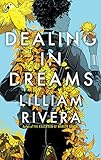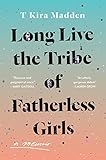When I’m in a slump, I have friends who know how to put me back on track. Last fall, the state of the world and my place in it—and, by extension, my writing—had reached a low point. At just the right moment, a friend handed me an advanced reading copy of Jaquira Díaz’s Ordinary Girls, a debut memoir about family, queerness, identity, and being seen.
I wasn’t ready for this book. Yet all my life I’d been waiting for this book. In Ordinary Girls, Díaz writes about vital subject matter with a brilliance I wanted to understand. It’s not hyperbolic to say that, at times, I literally had the breath knocked out of me reading Díaz’s words on the page. I asked myself over and over again how she did this, and then I thought, what if I asked her?
I was thrilled when she agreed to the interview. When we got on the phone together, we talked about grief, complicated relationships, craft, and just whom Díaz is writing for.
The Millions: I love on the last page of Ordinary Girls you talk about the girls you wrote the book for. Why is it so important that the book reaches these girls?
Jaquira Díaz: It was important for me throughout the process to remember whom I was writing for, because otherwise I would have stopped writing. It was so difficult to get this book out. And to be honest, the book wouldn’t let me go. I had to get it out of the way before writing other things, before moving on to writing fiction. And, in order to do that, to finish the project, I needed to remind myself whom I was writing it for. So it helped to keep returning to the opening. I kept thinking about all the books I needed when I was growing up, when I was in school, and all we read in class were books by cis, straight, white men. And I kept thinking about how this book might be the first time a queer Latina, a queer Afro-Latina, sees herself in a book, and how that would have been important to me growing up.
TM: This was one of those books I read that made me feel seen in a lot of ways I hadn’t before, and I could imagine how impactful it would have been if I had this book when I was younger. You write about carrying the weight of intergenerational trauma and the history of your people no matter where you go. Do you feel that writing this book has changed the feeling of that somehow?
JD: Yes, absolutely. It felt like in all these years of writing, I had been avoiding writing this book, avoiding talking about sexual violence, colonialism, trauma. I felt that in some ways by being silent I was contributing to the violence and erasure that is so prevalent in our communities, that haunts our communities. Talking about sexual violence and colonialism and other kinds of racialized violence—how not talking about it can feel like a burden. The process itself was grueling, but being done with it felt like such an accomplishment. It’s the hardest thing I’ve ever done. It took 12 years to finish the book, and I’m definitely changed after having written it. I have more faith in God now. I have more faith in myself. I feel much stronger, definitely much stronger than I was right in the middle of writing it. The book literally made me sick. I had the worst insomnia of my life while writing this book. I gained weight. I lost weight. I gained weight again. I had to go to the hospital because I wasn’t sleeping. It took a real physical toll on my health; so being done with it feels like such an accomplishment.
TM: You write about very complicated relationships with your family and chosen family in super difficult situations. And I feel like you do so without anger or bitterness. Instead, you do it with fairness. How did you do that?
JD: First of all, I needed to be honest about my role in all of this, about who I was and who my family was. It was very important to me to write about the real people, to be as close to the truth as possible. I needed to interrogate not just everyone else’s role, but myself and who I was. The project of this book became much more about making connections and interrogating things about the larger world than it was about telling a story. Which is why I keep returning to certain themes of girlhood, of sexual violence, of silence, of secrets, of monsters. And it became much more about making those connections and speaking out than it was about following one linear story. For years, I avoided writing about my mother, for example, because writing about my mother was so painful. She was one of the hardest people to write about because, in so many ways, she broke me.
I also thought, If I am not honest, readers will be able to tell. In that process of digging for the truth—for me, but also for my family members and my friends—I started thinking about forgiveness. In the middle of writing this book, I was able to forgive my mother, and we have a very different relationship now than we did back during the years that were covered in the book. We’re very close now. We have a loving relationship, and I think part of that was definitely forgiveness. You know how they say that when you forgive people, it’s much more about yourself than it is about them. It’s for you. And being able to forgive all the people in my life, and myself, that made all the difference. I definitely wanted to write something without pity or glory or anger, something that was honest. That spoke to a factual truth but also a larger truth.
TM: How did you write about grief when it came to complicated relationships? You talk about when your maternal grandmother passed away and you had not seen her for a while, but the grief hit you so viscerally. And it’s such a complicated relationship because there was a deep family bond, but there was also distance out of self-preservation. Can you talk more about that?
JD: When my mother’s mother—she died by suicide—when I found out that she died, I didn’t really understand what I was feeling because our relationship in life had been so painful. She was abusive. She was racist. She was homophobic. She was abusive in more ways than one. Physically, emotionally, psychologically. And I didn’t even know that what I was feeling was grief. During the years she was alive, I spent so much time telling myself that when she died, I wouldn’t feel anything. And when she actually died and I was finally facing the reality of it, I was actually questioning whether or not I was feeling grief. I wasn’t sure. I had this limited idea of what grief actually was, because of my experience with it, which had been mostly dealing with my paternal grandmother’s death. That was painful. But then I realized after Marcy died that grief was more than just one feeling. Grief was painful, but it was also joyous. And it was anger. And it was depression. And it was anxiety. Grief was like experiencing every single emotion you’ve ever felt all at once. And navigating that when my maternal grandmother died was much more difficult because I didn’t know what I was feeling.
TM: I’ve always had this question of what we are allowed to feel when it comes to grief and complicated relationships.
JD: I definitely felt that when Marcy died. Because I was sad and because I felt pain, I felt I was in some way betraying myself— she had inflicted so much pain on me and on my family.
It took a few months for me to feel like it was okay to feel what I was feeling. That it would never truly make sense but that that was fine.
TM: Near the end of the book, you wrote about the differences in how you processed the grief for both of your grandmothers. With your paternal grandmother, what do you feel like she would be most proud of?
JD: I think she would definitely be proud of the book, but she would be prouder of the way I live my life. That I have faith. That I found love. That I’m living in a way that’s true to who I am, that I’m not pretending to be someone else.
TM: Is there something about writing—about the kind of things that your book has—that you wish you would see more of in memoir?
JD I definitely wish that there were more writing about girlhood and navigating a certain kind of home. I definitely wish there was more writing about girls growing up in poverty. Queer girls, black and brown girls. I didn’t have any books like that growing up. I mean, I certainly looked for them. I went to a library and what the librarians handed me were books about white people written by white people, written mostly by white men. I wish that there were an abundance of books about brown and black girlhood, about girls who grew up working class or in poverty. I also wish that there that there were just more books about Puerto Ricans, both in Puerto Rico and in the diaspora. When I was writing this book, I mean, I searched out almost every book written by a Puerto Rican in English that I could possibly find. And there weren’t that many.
 TM: Yeah, I feel like when Lilliam Rivera’s novels (The Education of Margot Sanchez and Dealing in Dreams) had come out, I had similar thoughts.
TM: Yeah, I feel like when Lilliam Rivera’s novels (The Education of Margot Sanchez and Dealing in Dreams) had come out, I had similar thoughts.
JD: If only Lilliam had been writing when I was a girl—that would have changed my entire world.
 TM: And I felt similarly about T Kira Madden‘s memoir, Long Live the Tribe of Fatherless Girls, and then I felt the same thing with your memoir. There are so many different elements for me that resonated like being mixed race and what that means and how you’re looked at in this world. Why was it important to include writing about being mixed race?
TM: And I felt similarly about T Kira Madden‘s memoir, Long Live the Tribe of Fatherless Girls, and then I felt the same thing with your memoir. There are so many different elements for me that resonated like being mixed race and what that means and how you’re looked at in this world. Why was it important to include writing about being mixed race?
JD: Well, one of the things that I always knew growing up was that we definitely were not white. We definitely did not belong. We were made to feel—and by we, I mean my sister, my brother, and I— like we didn’t belong in my mother’s white family. We definitely didn’t look like them. Also, my black grandmother made it clear to us that we were a black family, and that no matter how we looked to the world, we were a black family and we would be treated like one. Those are things that in our families I knew, but when I went out into the world, when I went to school, nobody saw me as black. People didn’t know unless I told them. And sometimes people didn’t believe me. It always made me feel like I was both invisible and hyper-visible, living in some liminal state where no one really saw who I was. And it was very important to kind of get that through to the reader. How much of my childhood and adolescence and even much of my adulthood was spent without really being seen. And also how exhausting it is to go out into the world and have people look at you and not really see you, never really understand who you are.
TM: Do you feel like writing this book was also a way to bring some of that together?
JD Yeah, in some ways. We all have to have some sort of reckoning with race. Being biracial, being a light-skinned black person, also means that you might be racially ambiguous, that you walk in the world with a certain amount of privilege that other black people don’t have. And for me, I definitely feel like it’s my responsibility to use it to open opportunities for other black people who don’t have the privilege of being racially ambiguous or treated the way that I’m treated. I definitely feel like I’ve had access to a lot of things that some of my friends haven’t had access to. And there have been moments in certain organizations when I realize that there is a possibility that I got this opportunity because they didn’t know I was black and it certainly made me feel like shit, but also made me feel like I had a responsibility to try to open doors for other people.
TM: I know this was very hard to write, but what was a joyful element of writing your memoir?
JD: God, that’s a very difficult question because it was so, so hard. One of the most joyful moments, to be honest with you, was to be able to write the acknowledgements, to thank people who have meant something in my life and have helped me, even if they just helped in very small ways. And to show them how that very tiny thing they did was very important in making me who I am, in helping this book become a reality. That was probably the most joyful moment.
Bonus Links from Our Archive:
— ‘Ordinary Girls’: Featured Nonfiction by Jaquira Díaz
— A Year in Reading: Jaquira Díaz
The post Living in a Way That’s True: The Millions Interviews Jaquira Díaz appeared first on The Millions.
Source : Living in a Way That’s True: The Millions Interviews Jaquira Díaz











